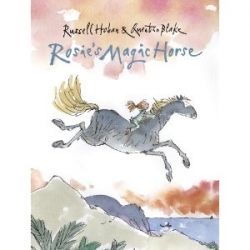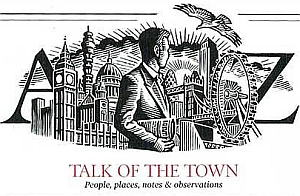I had very little time to 4qate this year, and the prospect of trying to find a quote (especially one I hadn't already used) from Russell Hoban's huge oeuvre seemed more daunting than ever, so I went back to first principles and tried to think of the main reasons I was initially attracted to his work. These were: a lyrical writing style; a great sense of humour; an ability to make mundane things fascinating; and a refusal to accept the 'limited-reality consensus'. I thought I would try and find a passage that not just represented those but which the average passing stranger might stand a chance of identifying with. With all of this in mind I reached firstly for Kleinzeit: I enjoyed revisiting both the long passages and the one-liners, but somehow it was all a bit too weird to grab the attention of the passer-by. Of course, weirdness is another reason I enjoy Russ's books, and you can divorce hardly any of the best bits within them from a general, all-pervading sense of weirdness. Fighting off a slight sense of futility, then, I remembered this passage - a shining snippet of dialogue between the protagonist Herman Orff and film-maker Gosta Kraken - from The Medusa Frequency, my first and probably still favourite Hoban novel, which met my criteria and also sat well with my intention this year of filming my 4qation for the website.
`What is Luise to you?'
`Lost. Gone. Two years only, then Znrvv! No more Luise. A note on the kitchen table like an unaccompanied cello in a studio with dusty windows.'
`Don't roll the credits over it; just tell me plangently when she left you.'
`Seven years ago with my sound man.'
`What do you suppose she heard in him?'
`Other music.'
`And what did she ever see in you?'
`Flickering images.'
`Of what?'
`It doesn't matter, it's the flickering that gives the excitement. Being is not a steady state but an occulting one: we are all of us a succession of stillnesses blurring into motion with the revolving of the wheel of action, and it is in those spaces of black betwen the pictures that we experience the heart of the mystery in which we are never allowed to rest. The flickering of a film interrupts the intolerable continuity of apparent world; subliminally it gives us those in-between spaces of black that we crave. The eye is hungry for this; eagerly it collaborates with the unwinding strip of celluloid that shows it twenty-four pictures per second, making real by an act of retinal retention the here-and-gone, the continual disappearing in which the lovers kiss, the shots are fired, the horses gallop, rrks?'
`Luise saw all that in you, did she?'
`It isn't only that I make films, I am in myself a big flickerer and women respond to this. I'm so much there/not there/there/not there. Very exciting. It stimulates a woman's natural
holding-on reflex.'
`And yet Luise seems to have let go of you.'
`Nothing is for ever.'
from The Medusa Frequency
As it happened, the video is of me reading the passage, but I didn't film the paper-drop itself as it didn't seem terribly cinematic. This was posted on a notice-board outside a nearby village church hall which always seems to be completely empty (both the hall and the notice-board): it was nice to finally see something on there - a Hoban quote especially.
If you have any problems viewing the video above try going direct to http://www.youtube.com/watch?v=2UyzfwgZiq4






 On 4 February 2012 the Slickman A4 Quotation Event celebrated
On 4 February 2012 the Slickman A4 Quotation Event celebrated 


 In 2005 the first international convention for Russell Hoban fans took place in London, and was marked by the publication of a fantastic 48-page booklet featuring exclusive contributions from innumerable fans and associates including novelist David Mitchell and actress Glenda Jackson. A wonderful memento of the event, it's also a beautiful collector's item and must-have for any Hoban fan. Although in limited supply, copies of the booklet are still available at £6.00 each plus p&p. Order direct from
In 2005 the first international convention for Russell Hoban fans took place in London, and was marked by the publication of a fantastic 48-page booklet featuring exclusive contributions from innumerable fans and associates including novelist David Mitchell and actress Glenda Jackson. A wonderful memento of the event, it's also a beautiful collector's item and must-have for any Hoban fan. Although in limited supply, copies of the booklet are still available at £6.00 each plus p&p. Order direct from  Russell Hoban turned 86 on 4 February 2011 and fans celebrated in traditional style by leaving quotes from his books in public places. Browse their quotes
Russell Hoban turned 86 on 4 February 2011 and fans celebrated in traditional style by leaving quotes from his books in public places. Browse their quotes  To celebrate 30 years in print of Russell Hoban's most famous novel
To celebrate 30 years in print of Russell Hoban's most famous novel 






No comments:
Post a Comment
Note: only a member of this blog may post a comment.